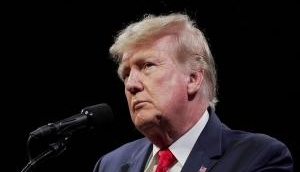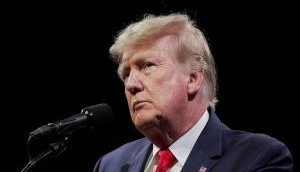Dawn of a new hope in Myanmar? Suu Kyi still has to walk a tightrope

The sticking point
Suu Kyi can\'t be President as per the current constitution, because her sons are foreign nationalsThe declaration of candidates for the Presidential election will happen on 17 MarchMore in the story
Can a deal be struck with the military to make Suu Kyi President?What are the other challenges facing the NLD and the country?Myanmar is on the threshold of a new political dawn. People have great expectations after having overwhelmingly voted for Aung San Suu Kyi's National League for Democracy (NLD) in the November 2015 general elections.
Although the outgoing Thein Sein government brought about a number of welcome reforms and greater openness during his five years in office after 50 years of military rule, his military-backed Union Solidarity and Development Party (USDP) suffered a crushing defeat in the polls, with people swaying towards the 'change' promised by the NLD.
But will a distinct change really come about? The country's constitution of 2008 was largely drafted by the military, and has given it an assured place in the governance of the country. The NLD has to cope with not only a 25% reservation in the Parliament for the military, but has to work with the military like a coalition partner, since certain key ministerial posts are reserved for it.
Also read: Winning was easy. Suu Kyi's real test is making Myanmar truly democratic
Can Suu Kyi be President?
Sections in the NLD are hoping that Suu Kyi may still be able to become President, even though Article 59(f) of the constitution expressly bars anyone having a close relative who is a foreign national. Both of Suu Kyi's sons hold foreign nationality.
Tin Oo, the veteran patron of NLD, said earlier this month that the post must be given to party leader Suu Kyi.
The constitution bars Suu Kyi from becoming President, because both her sons are foreign nationals
Some have talked about the possibility of suspending Article 59(f) with a simple majority vote in Parliament, citing a precedent from the U Nu/Ne Win era. But the 2008 constitution has no explicit provision for suspending an article, except in times of emergency. Unless the military is on board, the NLD may be taking a great risk if it proceeds only on the basis of a historical precedent.
It can also be argued that if one provision can be suspended now using a simple majority, then other provisions can also be suspended later using the same procedure.
Also read: Will Aung San Suu Kyi be named Myanmar's next president?
There is some speculation that the military could still be persuaded to accept this course, in return for accepting some of the demands it has reportedly made. These include chief ministerships of the three border ethnic states (Rakhine, Shan and Kachin) and of the Yangon region, apart from a few more ministerial berths at the Union level. These are in addition to the constitutionally-guaranteed ministries of Home, Border Affairs and Defence.
New date for Presidential election
As per the Constitution, three Vice-President candidates have to be chosen, one each by the elected members of the upper and lower houses of Parliament, and a third one by the group of military MPs belonging to both houses.
The combined house of Parliament (Pyidaungsu Hluttaw) then votes for these candidates, and the one who gets the maximum number of votes becomes the President and the other two serve as Vice-Presidents.
It was earlier expected that these names would become known by February. However, the Speaker of the Pyidaungsu Hluttaw announced recently that 17 March will be the date for naming the three Vice-Presidential candidates and for the Presidential election. This now leaves more time for closed-door consultations. A third meeting between the armed forces chief Min Aung Hlaing and Suu Kyi also took place on 17 February, but details are not known.
The military's message
While rumours abound that a deal may still be worked out, the military has been sending a consistent message - don't expect constitutional changes at the moment.
A hard-hitting article in 'Myawaddy', the military newspaper, earlier this month said Article 59(f) should not be changed for eternity. The spokesman of the military contingent in the Parliament has also stated recently that there was no discussion between the NLD and the military about Article 59(f), and that the article cannot be amended without the armed forces' approval.
Furthermore, President Thein Sein, in his message to the Pyidaungsu Hluttaw some days ago, has pointed out that as the highest legislative body, it had an obligation to lay emphasis upon doing things in conformity with the provisions enshrined in the constitution.
While a deal may still be worked out, the military says constitutional changes shouldn't be expected
Meanwhile, there are also unconfirmed reports that the armed forces chief, who was to retire this year on reaching sixty, has secured an extension for five more years.
Above the President
Considering the circumstances, it does appear that NLD may have to contend with nominating a candidate other than Suu Kyi for the post of President, at least temporarily. She may have to continue being the party leader, who will provide guidance informally and be 'above the President', as she promised before the polls.
Also read: Myanmar: Asia's youngest democracy begins Parliament session dominated by Aung San Suu Kyi's party
Walking a tightrope
The newly-elected Parliament has commenced work earlier this month. There are many challenges that lie ahead, even in the formation of the Union government and in the 14 states/regions.
In two ethnic majority states, Shan and Rakhine, the NLD by itself does not also have the majority. A fine balance that reflects the electoral wins but also secures the confidence and support of the ethnic groups will be essential.
This can create an environment for moving forward further with ethnic reconciliation and the peace process, which Suu Kyi has already said will be a priority.
Also read: Manipur-Myanmar attacks: the violence is unlikely to stop
The NLD must also be working out what the priorities and programmes of the new government will be
It will be important to see how it works to strengthen the institutional capacity for effective implementation. A big challenge may be to reform the general administration department, a centralised institution established by the military that falls under the Home ministry, which will remain in military control. A good working relationship with the armed forces will be important.
A ray of hope
Myanmar has come a long way in the last five years in transitioning towards greater openness and a version of guided democracy.
Also read: Myanmar is not Pakistan: 5 misconceptions about India's cross border attack
Despite constitutional constraints, Suu Kyi has fought for change because she recognises how much more the country needs in terms of reconciliation. The people have given her and the NLD a resounding mandate.
Over 25 years ago, a similar huge mandate went nowhere. Now, with a more mature and politically experienced Suu Kyi, the country has perhaps the best chance to usher in that change.
More in Catch:
#CourtAttack lays bare the real threat to this nation. It isn't Kanhaiya Kumar
#JNUCrackdown: Dear Mohandas Pai, we fund your sector, not opinions
#JNUCrackdown: You don't mess with a nationalist like BJP MLA OP Sharma
First published: 20 February 2016, 10:24 IST





![BJP's Kapil Mishra recreates Shankar Mahadevan’s ‘Breathless’ song to highlight Delhi pollution [WATCH] BJP's Kapil Mishra recreates Shankar Mahadevan’s ‘Breathless’ song to highlight Delhi pollution [WATCH]](https://images.catchnews.com/upload/2022/11/03/kapil-mishra_240884_300x172.png)

![Anupam Kher shares pictures of his toned body on 67th birthday [MUST SEE] Anupam Kher shares pictures of his toned body on 67th birthday [MUST SEE]](https://images.catchnews.com/upload/2022/03/07/Anupam_kher_231145_300x172.jpg)






